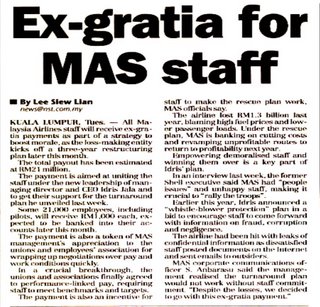
All Malaysia Airlines staff will receive
ex-gratia payments as part of a strategy to boost morale, as the loss-making entity kicks off a three-year restructuring plan later this month. The total payout has been estimated at RM21 million.
The payment is aimed at uniting the staff under the new leadership of managing director and CEO Idris Jala and to get their support for the turnaround plan he unveiled last week. Some 21,000 employees, including pilots, will each receive RM1,000 each, expected to be banked into their accounts later this month.
The payment is also a token of MAS management’s appreciation to the unions and employees’ association for wrapping up negotiations over pay and work conditions quickly.
Under the rescue plan, MAS is banking on empowering demoralised staff and winning them over is a key part of Jala's plan. In an interview last week, the former Shell executive said MAS had "people issues" and unhappy staff, making it crucial to "rally the troops".
MAS corporate communications officer S. Anbarasu said the management realised the turnaround plan would not work without staff commitment. "Despite the losses, we decided to go with this ex-gratia payment."
Now we know how Idris Jala sets out to put his turnaround plan to work - First, "bribe" all the staff so that they buy-in the Jala's Plan. It works; so it seems.
But would this motivation last?
Let's consider two rules of law in management:
(1) Murphy's Law: Whatever you think can happen will happen.
(2) Marlow's Hierarchy of Needs
In Maslow's Needs theory, it will begin from physiological needs. Once it's met, the need evolve and the crave for safety and social needs arises. Thereafter, there will be self-esteem and self-actualization.
However, it must be noted that the realism in MAS over the decades of inefficiencies and 'cartelism', resulting in continuous and consistent failures to generate sustainable profits, if not removed or possibly eliminated, would not transform the system into an effective and competent organization. As long as the virus and bacterias remain the core controller, no matter how you treat the tumor, the virus will continue to multiply and divide.
At such, the Jala turnaround could possibly see an improved result but unsustainable. This was the similar scenario years back. MAS was revamped several times, each time with some signs of improvement over a short period and then, back to the same old song. History will repeat itself.
It looks like Jala will see a year or two of better and improve results; good enough to take some credit and check out early before the next downturn strikes. A new man will then take over for the next phase of rebuilding the pieces.
Case study: Bank Bumiputera, Perwaja, Celcom, Mobikom, etc.
The payment is aimed at uniting the staff under the new leadership of managing director and CEO Idris Jala and to get their support for the turnaround plan he unveiled last week. Some 21,000 employees, including pilots, will each receive RM1,000 each, expected to be banked into their accounts later this month.
The payment is also a token of MAS management’s appreciation to the unions and employees’ association for wrapping up negotiations over pay and work conditions quickly.
Under the rescue plan, MAS is banking on empowering demoralised staff and winning them over is a key part of Jala's plan. In an interview last week, the former Shell executive said MAS had "people issues" and unhappy staff, making it crucial to "rally the troops".
MAS corporate communications officer S. Anbarasu said the management realised the turnaround plan would not work without staff commitment. "Despite the losses, we decided to go with this ex-gratia payment."
Now we know how Idris Jala sets out to put his turnaround plan to work - First, "bribe" all the staff so that they buy-in the Jala's Plan. It works; so it seems.
But would this motivation last?
Let's consider two rules of law in management:
(1) Murphy's Law: Whatever you think can happen will happen.
(2) Marlow's Hierarchy of Needs
In Maslow's Needs theory, it will begin from physiological needs. Once it's met, the need evolve and the crave for safety and social needs arises. Thereafter, there will be self-esteem and self-actualization.
However, it must be noted that the realism in MAS over the decades of inefficiencies and 'cartelism', resulting in continuous and consistent failures to generate sustainable profits, if not removed or possibly eliminated, would not transform the system into an effective and competent organization. As long as the virus and bacterias remain the core controller, no matter how you treat the tumor, the virus will continue to multiply and divide.
At such, the Jala turnaround could possibly see an improved result but unsustainable. This was the similar scenario years back. MAS was revamped several times, each time with some signs of improvement over a short period and then, back to the same old song. History will repeat itself.
It looks like Jala will see a year or two of better and improve results; good enough to take some credit and check out early before the next downturn strikes. A new man will then take over for the next phase of rebuilding the pieces.
Case study: Bank Bumiputera, Perwaja, Celcom, Mobikom, etc.
No comments:
Post a Comment